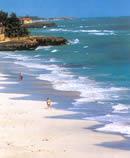Twenty practical tips to travel along the caribbean.
1. PLANNING. Before traveling, it is advisable to be informed on the country we are to visit.
2. WHAT TO WEAR. Short, bermudas, blouses, shirts and loose dresses, made of fresh and soft fabric, short trousers and pareus, the bathing suit and the straw hats are the most suitable outfit.
3. LOST AND FOUND. In case that upon arrival to your destination, you notice that your luggage has not arrived, go directly to the nearest Lost and Found Department.
4. TEMPERATURE. The average temperature fluctuates between 27° and 29°, but it's reduced when the latitude raises.
5. LANGUAGE. Spanish is spoken in most Caribbean countries. French and English are likewise spoken in many areas,
6. SAFETY. Theft and robbery are rare; what is annoying is the insistence of sellers at the beach. Poverty is abundant and thus minor stealing is common.
7. WORKING HOURS. Usually in the morning from 8:00 or 9:00 to 12:00 m and in the afternoon from 14:00 hs until closing that is usually at 18:00 hs.
8. HEALTH. It's not compulsory to be vaccinated, though, it's frequently recommended to be vaccinated against poliomyelitis, typhus, tetanus and hepatitis A.
9. RECOMMENDED MEDICINES. It's good to carry aspirins and drugs to fight the flu and also any antidiarrhea medicine.
10. SUNTAN. It's recommendable to be cautious when having a suntan. It's convenient to wear a hat, pants and long sleeves the first days.
11. BITES: It's convenient to carry mosquito repellent. Sort of green spirals are available at the stores, they are lighted in the evening and are suitable to fight mosquitoes.
12. CURRENCY. In the islands when the Eastern Caribbean dollar (EC$) is used as Anguila, Antigua, Dominica, Grenada, Montserrat, Nevis, St. Christopher, St. Lucia, and St. Vicent, the exchange rate coincides with the US dollar, accepted almost everywhere. There are other specific currencies as the Aruba's dollar, the Cuban peso, the dollar from Barbados, the Dominican peso or the florin of the Dutch Antilles; but in most cases, US dollar is accepted.
13. TRAVEL INSURANCE. Travel insurance covers accident, health, luggage, properties and flight cancellation.
14. GASTRONOMY. Regarding the art of cooking, each country has its own specific specialties, but all these countries have common or basic dishes as rice and beans, potatoes or a wide variety of fishes.
15. WATER. Don't drink tap water, but bottled or purified with disinfectant pills.
16. PRECAUTIONS IN THE BEACH. Before splashing on the water, one should ask locals if there is some danger in the area.
17. HURRICANES. Hurricanes and tropical storms are the most dangerous phenomena of these areas and, thus it's convenient to be ready to be evacuated or abandon the hotel or the apartment where you are staying.
18. PETS. It's necessary to request information on this subject to the tourism offices or the embassy in each country since in some of them, the entrance of this kind of animals is forbidden.
19. TAXIS. Rates are usually low. If you receive an excellent service, it's convenient to return the favor with a good tip¾between 15% and 20% of the proper amount.
20. TRAVELING WITH CHILDREN. Most of the hotels have facilities, infrastructure and activities geared to the little ones


































































